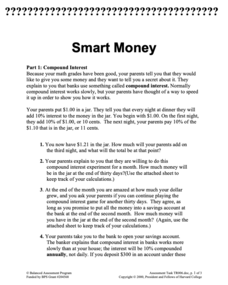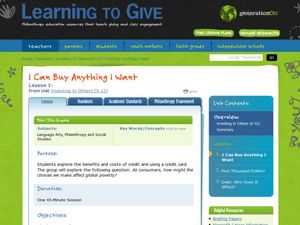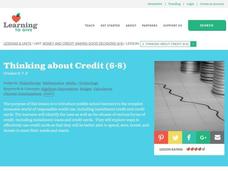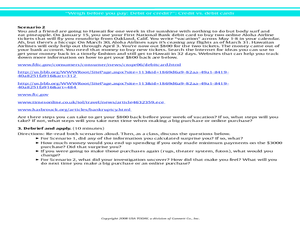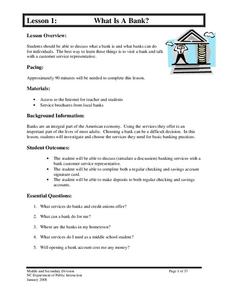Practical Money Skills
Understanding Credit
Help your young consumers learn about credit and the importance of credit history. With a thorough lesson plan about the ins and outs of credit, as well as the potential pitfalls of having a line of credit, kids will be well-equipped to...
Concord Consortium
Smart Money
Watch the money grow daily. Scholars tackle a problem to determine how much money they will have if a dollar grows at 10 percent compounded daily after a month. Using that knowledge, learners notice the difference between varying savings...
Curated OER
Credit - Good? Bad?
Students examine credit cards. They explore the detrimental effects that result from debt and poor credit. Students analyze interest rates, minimum balances, and consumer debt. Students survey the benefits of credit cards.
Curated OER
I Can Buy Anything I Want: Consumer Debt and Social Responsibility
A clear, comprehensive overview of consumer debt, credit, interest, international currency, and social responsibility, this 45-minute session falters in the application stage. You'll need to create a way for learners to demonstrate their...
Texas Education Agency (TEA)
Credit Scores and Your Financial Future
How important is a credit score, anyway? Scholars view a PowerPoint and take notes about credit scores. Next, they write essays explaining their plans for achieving a good credit score.
Curated OER
Buying on Credit
Explore using credit in this financial responsibility and math lesson. Learn to identify the acronym of "PRT" as Principle x Rate x Time, then calculate interest based on this formula. Do some real-world problem solving and choose...
Visa
The Danger of Debt: Avoiding Financial Pitfalls
How can our perspectives of borrowing and returning influence the way we view credit? Pupils explore the concept of debt, how it impacts our ability to obtain credit, and finally the ways in which we can work to alleviate debt.
PwC Financial Literacy
Credit Reports
Middle schoolers discover why it's important to establish a positive credit history and understand the value of credit reports to lenders and borrowers. They apply legal guidelines to establish the uses of a credit report other than...
Texas Education Agency (TEA)
Identity Theft and Credit Safety
Deter, detect, defect. Pupils watch a PowerPoint presentation and video about identity theft and credit card safety, taking notes to use later. Next, they develop a plan for maintaining credit safety and write an essay about the topic.
Curated OER
Thinking About Credit
Students explore the concept of credit. In this credit lesson, students discuss what it means to buy items using credit. Students discuss how interest accrues and how much is really being paid with a credit card. Students calculate...
Federal Reserve Bank
Banking on Debit Cards
What are the advantages and disadvantages of using a credit card versus a debit card? What are the costs of using a debit card irresponsibly? Here you'll find a lesson on key concepts that every learner should know regarding personal...
Visa
Keeping Score: Why Credit Matters
How does one get credit, and who provides credit? What is a credit score, and how can an understanding of a credit score help you to make smart financial decisions? Through discussion and worksheets, class members will identify the...
Curated OER
Number and Operation: All About Monday - Does it Pay?
Solve real-world financial math problems. High schoolers will work through a series of problems as they look at credit card interest, bill payment, and other real-world personal money matters.
Curated OER
Thinking About Credit
Students examine the use of credit such as installment purchases and credit cards. In this credit lesson, students learn the vocabulary associated with credit usage such as mortgage, credit report/score, and debit cards. They determine...
Curated OER
Pay Credit When Credit is Due
Pupils explore the concept of credit. In this credit lesson plan, students examine student organizers that focus on credit scores and credit history. Pupils participate in an on-line activity. Students examine credit card offers and...
Curated OER
Credit: Taking an Interest in Credit
Students examine how credit works but looking at how credit cards and interest rates work. They use percentages to solve problems using credit card interest rates while completing a worksheets.
Curated OER
Weigh Before You Pay: Debit or Credit?
Pupils explore the concept of debit and credit cards. In this debit and credit card lesson, students read an article about debit and credit cards. Pupils discuss differences between the two forms of payment. Students calculate the true...
Curated OER
Filling Empty Pockets: Borrowing, Loans, and Credit
Students examine credit components and how each works within our economy today. In this financial literacy lesson plan, students explore credit terms and make decisions based on real credit card offers that they find in their on line...
Curated OER
Shopping for Credit Exercise
In this personal budgeting worksheet, students compare 3 credit card offers and determine which would benefit them the most. Students respond to 6 short answer questions about the exercise.
Federal Reserve Bank
Keep the Currency
Each day, people throw currency away in different ways because of a lack of financial knowledge. Introduce your learners to the importance of financial literacy and assess their understanding of banking and personal finance.
Curated OER
Credit Cards and Compound Interests-Exponential Growth
Eleventh graders investigate the way credit cards work when collecting interest. In this algebra instructional activity, 11th graders investigate the growth of interest exponentially when using a credit card. They calculate what the...
North Carolina Department of Public Instruction
What Is A Bank?
You're never too young to learn about banking and personal finance. Use a set of seven banking lessons to teach middle schoolers about checking and savings accounts, interest rates, loans and credit cards, and safety deposit boxes.
Wells Fargo
Hands on Banking
What happens to your money between the time you make a bank deposit and the time you decide to spend it? Take middle schoolers and teens through the process of opening checking and savings accounts, creating a personal budget,...
Federal Reserve Bank
Your Credit Report
What is your credit score? How do you find it? Help your pupils answer these questions and more. They will access their free credit report and then analyze its meaning.
Other popular searches
- Credit Card Debt
- Credit Card Math
- Credit Card Fraud
- Interest Rates Credit Cards
- Credit Card Lessons
- Debit and Credit Cards
- Business Math, Credit Cards
- Credit Card Interest Rates
- Credit Cards Internet
- Credit Cards Calculations
- Introduction to Credit Cards
- Economics Credit Cards



